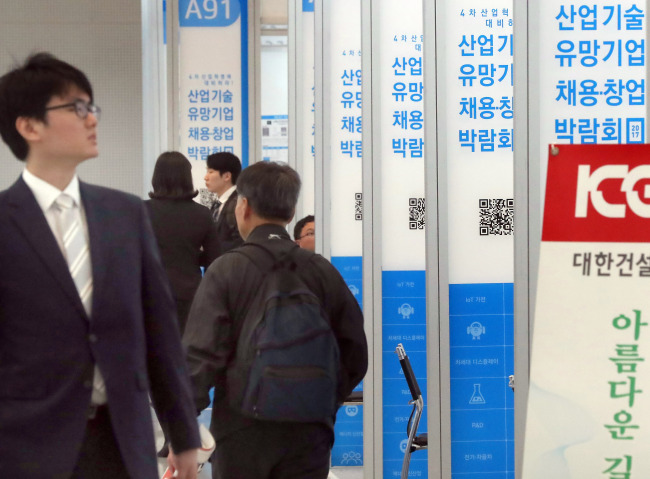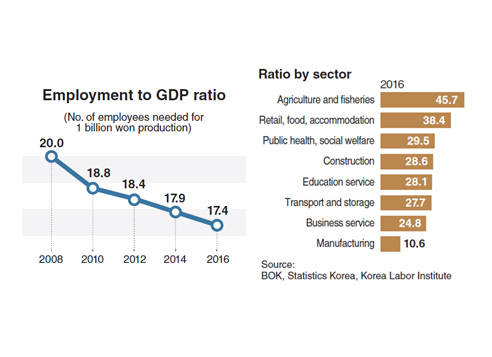South Korea’s economic growth is not leading to local job creation, as the manufacturing sector’s contribution to employment has weakened in recent years, data showed Monday.
The number of employees needed for 1 billion won ($883,000) in gross domestic product fell to a record low of 17.4 in 2016, according to data from the Bank of Korea, Statistics Korea and the Korea Labor Institute.
The figure has declined since 2008, when it first fell below 20.
The number of employees needed for 1 billion won ($883,000) in gross domestic product fell to a record low of 17.4 in 2016, according to data from the Bank of Korea, Statistics Korea and the Korea Labor Institute.
The figure has declined since 2008, when it first fell below 20.

Employment elasticity, or the growth rate of employment divided by the GDP growth rate, also plunged to 0.421 last year from 0.504 a year earlier. The higher the employment elasticity, the more job opportunities the economy is likely to generate.
By sector, agriculture and fisheries created the most jobs at 45.7 per 1 billion won of GDP last year, followed by retail, food and accommodations with 38.4, public health and social service with 29.5 and construction at 28.6.
The manufacturing sector only generated 10.6 jobs per 1 billion won of GDP last year, falling 0.2 from a year prior.
The manufacturing industry in Korea accounted for 31 percent of the nation’s GDP in 2014, the highest proportion among the members of the Organization for Economic Cooperation and Development.
Although the manufacturing sector’s on-year growth hit 4.4 percent in the first quarter of this year, the number of employees in the sector fell by 112,000 during the same period.

According to data from the Export-Import Bank of Korea, the nation’s total overseas direct investment hit a record high of $35.2 billion in 2016, growing from $23.1 billion in 2007.
Rep. Kim Jong-min of the Democratic Party of Korea recently revealed that Korean conglomerates’ corporate tax payments in foreign countries increased 2.9 times to 4.69 trillion won in 2015 from 1.64 trillion won in 2011.
Robots are also taking away jobs. Korea ranked No. 1 in terms of the number of industrial robots deployed per 10,000 workers, with 531 robots in 2015, leading Singapore with 398 and Japan with 305, according to the International Federation of Robotics.
Policymakers and economists have repeatedly called for deregulation in the service sector to create more jobs.
BOK Gov. Lee Ju-yeol recently said more jobs should be created in the service sector rather than in manufacturing in order to boost sluggish private consumption, which would in turn enhance people’s income and boost economic growth.
Meanwhile, Korea’s employment rate of seniors aged 75 and over topped OECD members for the fifth consecutive year in 2015, at 17.9 percent. This could reflect wider opportunities for older, eligible workers, but it also represents a weaker social safety net that forces those who are older to continue working, with many in irregular and unstable job positions, think tank Seoul Institute said.
By Kim Yoon-mi (yoonmi@heraldcorp.com)
By sector, agriculture and fisheries created the most jobs at 45.7 per 1 billion won of GDP last year, followed by retail, food and accommodations with 38.4, public health and social service with 29.5 and construction at 28.6.
The manufacturing sector only generated 10.6 jobs per 1 billion won of GDP last year, falling 0.2 from a year prior.
The manufacturing industry in Korea accounted for 31 percent of the nation’s GDP in 2014, the highest proportion among the members of the Organization for Economic Cooperation and Development.
Although the manufacturing sector’s on-year growth hit 4.4 percent in the first quarter of this year, the number of employees in the sector fell by 112,000 during the same period.

According to data from the Export-Import Bank of Korea, the nation’s total overseas direct investment hit a record high of $35.2 billion in 2016, growing from $23.1 billion in 2007.
Rep. Kim Jong-min of the Democratic Party of Korea recently revealed that Korean conglomerates’ corporate tax payments in foreign countries increased 2.9 times to 4.69 trillion won in 2015 from 1.64 trillion won in 2011.
Robots are also taking away jobs. Korea ranked No. 1 in terms of the number of industrial robots deployed per 10,000 workers, with 531 robots in 2015, leading Singapore with 398 and Japan with 305, according to the International Federation of Robotics.
Policymakers and economists have repeatedly called for deregulation in the service sector to create more jobs.
BOK Gov. Lee Ju-yeol recently said more jobs should be created in the service sector rather than in manufacturing in order to boost sluggish private consumption, which would in turn enhance people’s income and boost economic growth.
Meanwhile, Korea’s employment rate of seniors aged 75 and over topped OECD members for the fifth consecutive year in 2015, at 17.9 percent. This could reflect wider opportunities for older, eligible workers, but it also represents a weaker social safety net that forces those who are older to continue working, with many in irregular and unstable job positions, think tank Seoul Institute said.
By Kim Yoon-mi (yoonmi@heraldcorp.com)
-
Articles by Korea Herald







![[Graphic News] More Koreans say they plan long-distance trips this year](http://res.heraldm.com/phpwas/restmb_idxmake.php?idx=644&simg=/content/image/2024/04/17/20240417050828_0.gif&u=)
![[KH Explains] Hyundai's full hybrid edge to pay off amid slow transition to pure EVs](http://res.heraldm.com/phpwas/restmb_idxmake.php?idx=644&simg=/content/image/2024/04/18/20240418050645_0.jpg&u=20240419100350)






![[From the Scene] Monks, Buddhists hail return of remains of Buddhas](http://res.heraldm.com/phpwas/restmb_idxmake.php?idx=652&simg=/content/image/2024/04/19/20240419050617_0.jpg&u=20240419175937)

![[KH Explains] Hyundai's full hybrid edge to pay off amid slow transition to pure EVs](http://res.heraldm.com/phpwas/restmb_idxmake.php?idx=652&simg=/content/image/2024/04/18/20240418050645_0.jpg&u=20240419100350)

![[Today’s K-pop] Illit drops debut single remix](http://res.heraldm.com/phpwas/restmb_idxmake.php?idx=642&simg=/content/image/2024/04/19/20240419050612_0.jpg&u=)